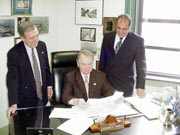Many politicians proclaim that their main goal in office is to stabilize taxes, but few actually succeed.
The Weehawken Township Council beat the odds Wednesday night by introducing a 2001-2002 municipal budget that is almost a complete mirror image of the budget that was adopted a year ago.
In fact, the budget is actually $550,000 lower – from $22,452,460 last year to $21,900,356 this year. Because of this, there will be no tax increase and the tax levy raised from real estate taxes will also remain virtually the same.
The tax levy raised from taxes will be $9,333,669 – down $1,000 from a year ago.
"The differences are basically irrelevant," Weehawken Mayor Richard Turner said last week. "We’ve been working very hard to keep the taxes down. The goal every year is to prevent tax increases. This year, we’ve been fortunate enough to accomplish that goal."
The budget was introduced at a later date than usual because of the events that transpired after the World Trade Center terrorist attacks on Sept. 11.
"Usually, we have the budget ready to be introduced around Labor Day," Turner said. "But from Sept. 11 on, we’ve had so many other important things to do. We were all set to go at the end of September, but then something else happened. We had to concentrate our efforts to what was going on."
So how is a municipality able to keep the overall tax rate (29.67 per $1,000 of assessed property value) the same from a year ago?
Turner believes that there are several reasons.
"We’ve reduced some of our overtime costs, and because of the recession, we’re putting off purchasing some other equipment that we were going to purchase," Turner said.
Another saving in earnings comes from two vacant positions in the police department that are not going to be filled at the present time. Two of the recruits sworn into office over the summer dropped out of contention to become patrol officers when they failed to get through the Bergen County Police Academy process.
"All of these things begin to add up in the savings," Turner said.
Turner said that the remainder of the $21 million raised outside of taxation – roughly $13 million – comes from state aid, municipal court fines, and interest accrued on previous township investments. Because of the economy and the lower interest rates, Turner said that the township cannot anticipate receiving additional revenues from investments.
"We’ve also decided to tune our activity down," Turner said, citing slight cutbacks in appropriations to township agencies. "We’re just being frugal across the board."
Another key to the tax stability comes from Weehawken’s participation in the Regional Efficiency Assistance Program (REAP), which provides homeowners a tax credit for Weehawken’s part in the North Hudson Regional Fire and Rescue.
"If you live in town and own property, then you get a tremendous tax credit with REAP," Turner said.
Turner said that another major reason for the township’s ability to keep a stable budget stems from the addition of $22 million in ratables, especially along the Hudson River waterfront. Since Roseland Properties, Inc. received the proper approvals from the Weehawken Planning Board to develop a proposed $500 million housing and office project, the township was able to reassess the land value.
"It’s no longer declared vacant land," Turner said. "Once Roseland got the approvals, it added to the value of the property. This is before they build. Once they build, the property value will go up even more."
The proposed additions to Hartz Mountain Industries’ holdings in Lincoln Harbor will also add to the new ratable base. A larger ratable base means more properties paying taxes, and that means that each taxpayer should be able to contribute less.
"The addition in ratables and a tight spending budget are the reasons why we’ve been able to stabilize," Turner said. "What we’re extremely proud of that this is a continuation budget, with a few changes. We try to hold the line on municipal taxes and they’re now lower than what they were in 1998. Almost no other town can say that. It’s unheard of."
Added Turner, "We set out to have stable taxes and we produced it."
Turner said that the overtime costs for emergency workers dealing with the World Trade Center tragedy will be reimbursed by the Federal Emergency Management Agency (FEMA).
There will be a public hearing on the 2001-2002 municipal budget, which runs from July 1, 2001 through June 30, 2002, at the council meeting on Dec. 26. Following public comments, the council can vote to pass the budget.
